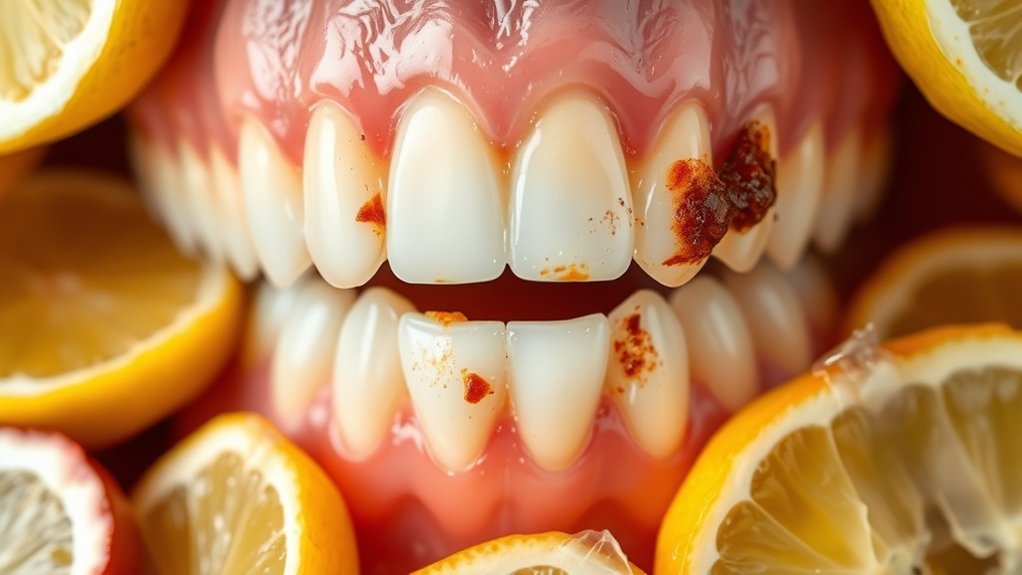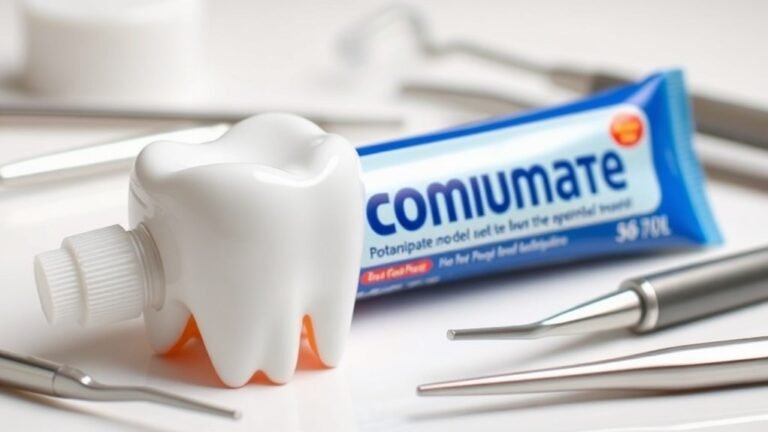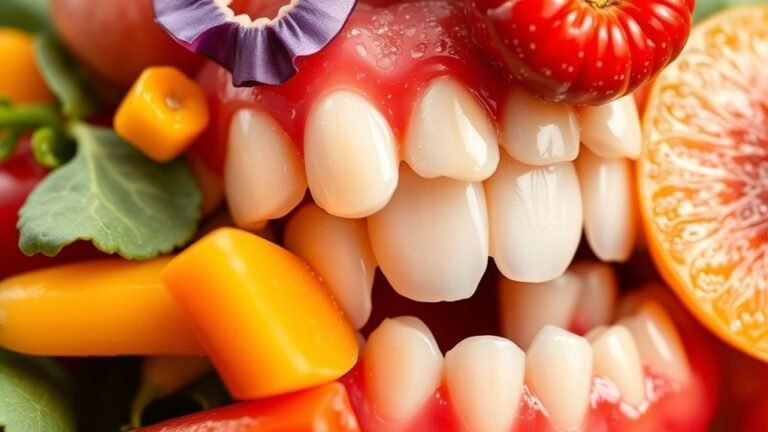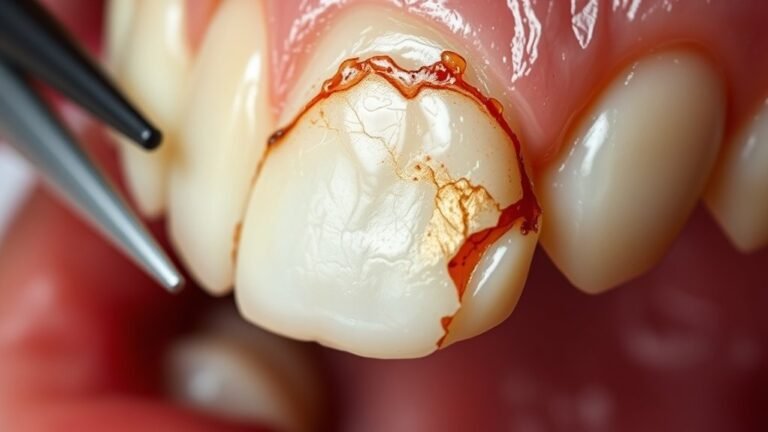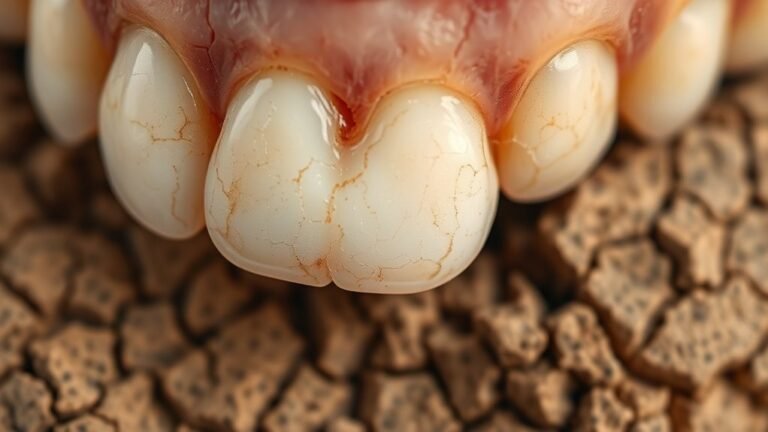How Does Acidic Food and Drinks Damage Tooth Enamel and Cause Sensitivity
Acidic foods and drinks can weaken your tooth enamel by lowering the pH in your mouth, leading to erosion and increased sensitivity. When you consume items like citrus fruits, soda, or wine, the acids dissolve essential minerals from your teeth. This erosion exposes sensitive dentin, resulting in sharp pain when eating or drinking. To protect your enamel, it’s vital to limit acidic intake and consider preventive strategies. There’s more to explore about keeping your teeth healthy in an acidic world.
Key Takeaways
- Acidic foods and drinks lower the mouth’s pH, weakening tooth enamel over time.
- Frequent consumption of acidic items dissolves minerals in teeth, leading to enamel erosion.
- Thinned enamel results in increased sensitivity, causing sharp pain with hot, cold, or sweet items.
- Poor oral hygiene practices exacerbate the effects of acidic foods on enamel damage.
- Rinsing the mouth with water after consuming acids can help protect and preserve enamel.
Understanding Tooth Enamel and Its Importance
Tooth enamel, the hard outer layer of your teeth, plays an essential role in dental health. It protects your teeth from decay, sensitivity, and external damage. However, tooth enamel damage can occur from various sources, including acidic foods and drinks, which can erode this crucial barrier. Maintaining strong tooth enamel is critical for your overall oral health, as weakened enamel can lead to cavities and increased sensitivity. Fortunately, your body has a natural process called enamel remineralization, where minerals like calcium and phosphate are redeposited into enamel. To support this process, incorporate fluoride toothpaste into your routine and consume foods rich in these minerals. By understanding tooth enamel’s importance, you can take proactive steps to protect your smile.
The Role of Acidity in Enamel Erosion
Acidity plays a significant role in the erosion of tooth enamel, making it vital to understand how it affects your dental health. When you consume acidic food and drinks, the pH level in your mouth drops, leading to an environment that can weaken enamel over time. This process of enamel erosion occurs as the acids dissolve the minerals in your teeth, diminishing their protective layer. As enamel thins, you may start experiencing dental sensitivity, especially to hot, cold, or sweet stimuli. It’s important to be aware of how frequently you consume these acidic items and how they contribute to the gradual deterioration of your enamel. Protecting your teeth from such erosion is essential for maintaining overall dental health.
Common Acidic Foods and Their Effects
Many everyday foods and beverages can contribute to enamel erosion due to their acidic nature. You might not realize how much these acidic drinks can affect your dental care. Regular consumption can lead to significant enamel wear, making your teeth more vulnerable.
| Acidic Food/Drink | Effects on Enamel |
|---|---|
| Citrus Fruits | High acidity, promotes erosion |
| Soda | Contains phosphoric acid, weakens enamel |
| Wine | Acidic pH, increases sensitivity |
| Pickles | Vinegar content, leads to wear |
| Sports Drinks | High sugar and acid, accelerates damage |
Being aware of these foods helps you make informed choices. Protecting your enamel is essential, so consider moderating your intake for better dental health.
How Enamel Erosion Leads to Tooth Sensitivity
Enamel erosion is a common issue that can lead to increased tooth sensitivity. You may experience discomfort when consuming hot, cold, or acidic foods as the protective layer of enamel wears away. Understanding the causes, symptoms, and potential treatments for enamel erosion is essential for maintaining your dental health.
Causes of Enamel Erosion
When you consume acidic foods and beverages, you’re not just indulging your taste buds; you’re also putting your tooth enamel at risk. Acid erosion can lead to significant enamel loss, making your teeth vulnerable to dental caries and sensitivity. Understanding the causes of this erosion is essential for maintaining your oral health.
| Cause of Erosion | Impact on Enamel | Prevention Tips |
|---|---|---|
| Citrus fruits | Increases acidity | Rinse mouth with water |
| Carbonated drinks | Lowers pH | Limit consumption |
| Sugary snacks | Promotes decay | Choose healthier options |
| Wine and vinegar | Erodes enamel | Use a straw |
| Poor oral hygiene | Accelerates erosion | Brush and floss daily |
Symptoms of Tooth Sensitivity
Tooth sensitivity can manifest as a sharp, sudden pain when you consume hot, cold, sweet, or acidic foods and beverages. This discomfort often occurs due to dentin exposure, which happens when enamel erodes, leaving the underlying layer of your teeth vulnerable. You may also experience heightened sensitivity when brushing your teeth or using dental products. Maintaining excellent oral hygiene is fundamental in managing these symptoms. Regular brushing and flossing can help minimize further enamel erosion and protect against tooth sensitivity. If you find that your sensitivity persists, it’s essential to consult a dental professional for an evaluation. Addressing tooth sensitivity early can help prevent more significant dental issues and improve your overall oral health.
Prevention and Treatment Options
While you may not realize it, the foods and beverages you consume play a crucial role in maintaining your tooth enamel. To prevent erosion, focus on cavity prevention by limiting acidic foods and drinks, such as citrus fruits and sodas. Incorporate teeth protection strategies, like rinsing your mouth with water after consuming acidic items and waiting at least 30 minutes before brushing to avoid further damage. Additionally, consider using fluoride toothpaste or mouthwash, which can strengthen enamel. For those seeking natural remedies, try oil pulling with coconut oil or incorporating more dairy products, which can help neutralize acids. By adopting these practices, you can effectively safeguard your enamel and reduce sensitivity.
Recognizing Symptoms of Sensitive Teeth
Sensitive teeth can manifest in various ways, making it vital to recognize their symptoms early. You might experience sharp pain when consuming hot, cold, or sweet foods and drinks, a clear sign of dentin hypersensitivity. This discomfort often arises from mineral loss in your enamel, exposing the underlying dentin and nerves. Additionally, you may notice an increase in sensitivity following acidic foods, which can disrupt the oral microbiome and contribute to further enamel erosion. Ignoring these symptoms could lead to more severe dental issues. By staying attuned to these signs, you can take proactive steps to address sensitivity and protect your dental health. Recognizing these symptoms early is essential for maintaining your overall oral well-being.
Practical Tips for Protecting Your Enamel
Maintaining strong enamel is essential for preventing sensitivity and protecting your overall dental health. Here are some practical tips to help you safeguard your enamel:
| Tip | Description | Benefits |
|---|---|---|
| Increase Saliva Flow | Chew sugar-free gum or eat crunchy fruits | Neutralizes acids, protects enamel |
| Adopt a Healthy Diet | Incorporate calcium-rich foods | Strengthens enamel, promotes health |
| Use Fluoride Mouthwash | Rinse daily with fluoride mouthwash | Remineralizes enamel, reduces sensitivity |
Maintaining Oral Health in an Acidic Diet
An acidic diet can pose significant challenges to your oral health, especially when it comes to preserving tooth enamel. To maintain your oral health, focus on balanced nutrition that includes calcium-rich foods, which can help strengthen enamel. Regularly brush and floss to minimize dental plaque buildup, as plaque can exacerbate enamel erosion. Consider rinsing your mouth with water after consuming acidic foods or drinks to neutralize acids. Additionally, schedule routine dental visits to monitor your enamel health and receive professional cleanings. Your dentist can offer tailored advice to manage sensitivity and recommend products designed to protect enamel. By staying proactive, you can better safeguard your smile even while enjoying your favorite acidic foods.
Frequently Asked Questions
Can Tooth Enamel Regenerate After Damage From Acidic Foods?
Tooth enamel can’t regenerate once damaged; it’s a mineralized substance without living cells. However, you can strengthen remaining enamel through fluoride treatments, good oral hygiene, and reducing acidic food and drink intake to prevent further erosion.
How Long Does It Take for Enamel Erosion to Occur?
Enamel erosion can begin within just a few minutes of exposure to acidic foods and drinks. Continuous exposure over time can greatly accelerate this process, leading to increased sensitivity and potential dental issues.
Are There Specific Beverages More Harmful Than Others?
Yes, citrus juices and sugary sodas are particularly harmful. Studies show that beverages with a pH below 5.5 can erode enamel considerably, increasing your risk of sensitivity and long-term dental issues. Stay cautious!
What Role Does Saliva Play in Protecting Tooth Enamel?
Saliva acts as a natural buffer, neutralizing acids and providing essential minerals that help remineralize tooth enamel. It also washes away food particles, reducing the risk of decay and maintaining overall oral health.
Can Dental Treatments Reverse Enamel Erosion Effects?
Think of enamel like a castle wall. Dental treatments can help restore some effects of erosion, but they can’t fully reverse damage. Regular care and preventive measures are essential to protect your teeth’s natural defenses.
Conclusion
In a world where your smile can light up a room, protecting your tooth enamel is essential. By being mindful of acidic foods and drinks, you can thwart the silent erosion that leads to sensitivity. Remember, every sip and bite matters—like a slow, creeping tide, acidity can wear away your defenses. By following simple tips and staying informed, you can maintain your radiant smile and enjoy your favorite foods without fear. Your teeth deserve that care.
